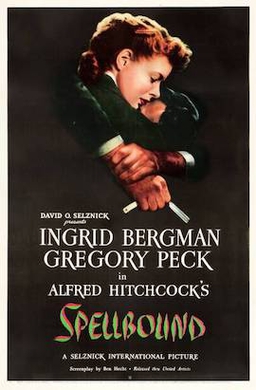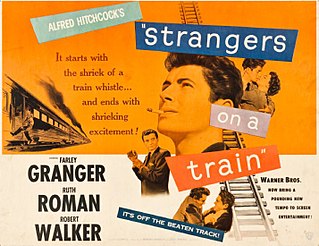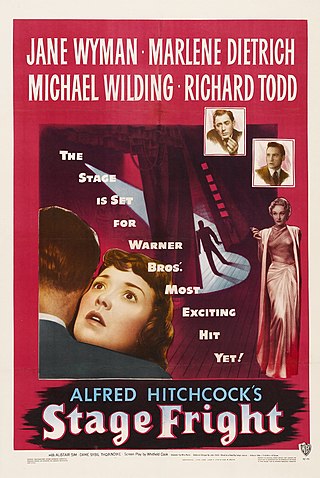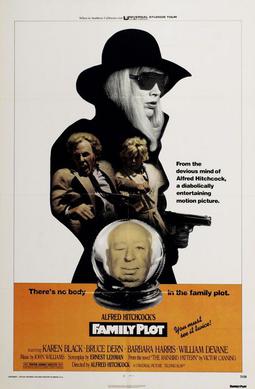Film adaptation
The novel was adapted for the screen by Anthony Shaffer. The title is taken from a line in the popular British music hall hit "It's a Long Way to Tipperary".
La Bern expressed his dissatisfaction with the adaptation in a letter to the editor of The Times . [1]
Though the adaptation is in fact fairly faithful, there are significant differences between the original novel and Hitchcock's film. The scenes between Inspector Oxford and his wife are not in the book. In La Bern's novel, the first murder is depicted from the murderer's viewpoint, with the reader unaware of his identity. A later scene also begins from the murderer's viewpoint, but midway through the scene the narrative suddenly reveals that he is Bob Rusk.
In the novel, the man falsely convicted of the murders is named Blamey, not Blaney, and nicknamed "Blameworthy". Most significantly, while Hitchcock set his film in the 1970s, the original novel takes place in the 1960s with several references to the Second World War. Richard Blamey was a Royal Air Force veteran who had participated in the Dresden fire-bombing as "chief candle dropper": He dropped the incendiary flares that enabled the bombers to find their targets. In the novel, he feels guilty for this. Blamey is drunk and confused when the police first interrogate him about the necktie murders, and he claims to have committed previous murders in Dresden. When a police officer asks him how many people he killed in Dresden, Blamey replies "thousands". This drunken confession is a factor in his eventual false conviction for the necktie murders.
A Tamil movie remake of this story, Kalaignan , was released in 1993.

Sir Alfred Joseph Hitchcock was an English film director. He is widely regarded as one of the most influential figures in the history of cinema. In a career spanning six decades, he directed over 50 feature films, many of which are still widely watched and studied today. Known as the "Master of Suspense", Hitchcock became as well known as any of his actors thanks to his many interviews, his cameo appearances in most of his films, and his hosting and producing the television anthology Alfred Hitchcock Presents (1955–65). His films garnered 46 Academy Award nominations, including six wins, although he never won the award for Best Director, despite five nominations.

Suspicion is a 1941 American romantic psychological thriller film noir directed by Alfred Hitchcock, and starring Cary Grant and Joan Fontaine as a married couple. It also features Sir Cedric Hardwicke, Nigel Bruce, Dame May Whitty, Isabel Jeans, Heather Angel, and Leo G. Carroll. Suspicion is based on Francis Iles's novel Before the Fact (1932).

Dial M for Murder is a 1954 American crime thriller film directed by Alfred Hitchcock, starring Ray Milland, Grace Kelly, Robert Cummings, Anthony Dawson, and John Williams. Both the screenplay and the successful stage play on which it was based were written by English playwright Frederick Knott. The play premiered in 1952 on BBC Television, before being performed on stage in the same year in London's West End in June, and then New York's Broadway in October.

Spellbound is a 1945 American psychological thriller directed by Alfred Hitchcock, and starring Ingrid Bergman, Gregory Peck, and Michael Chekhov. It follows a psychoanalyst who falls in love with the new head of the Vermont hospital in which she works, only to find that he is an imposter suffering dissociative amnesia, and potentially, a murderer. The film is based on the 1927 novel The House of Dr. Edwardes by Hilary Saint George Saunders and John Palmer.

The Thirty-Nine Steps is a 1915 adventure novel by the Scottish author John Buchan, first published by William Blackwood and Sons, Edinburgh. It was serialized in All-Story Weekly issues of 5 and 12 June 1915, and in Blackwood's Magazine between July and September 1915, before being published in book form in October of that year. It is the first of five novels featuring Richard Hannay, an all-action hero with a stiff upper lip and a knack for getting himself out of tricky situations.

Strangers on a Train is a 1951 American psychological thriller film noir produced and directed by Alfred Hitchcock, and based on the 1950 novel Strangers on a Train by Patricia Highsmith. It was shot in late 1950, and released by Warner Bros. on June 30, 1951, starring Farley Granger, Ruth Roman, and Robert Walker.

The Paradine Case is a 1947 courtroom drama with elements of film noir set in England, directed by Alfred Hitchcock and produced by David O. Selznick. Selznick and an uncredited Ben Hecht wrote the screenplay from an adaptation by Alma Reville and James Bridie of the 1933 novel by Robert Smythe Hichens. The film stars Gregory Peck, Ann Todd, Alida Valli, Charles Laughton, Charles Coburn, Ethel Barrymore, and Louis Jourdan. It tells of an English barrister who falls in love with a woman who is accused of murder, and how it affects his relationship with his wife.

The Lodger: A Story of the London Fog is a 1927 British silent thriller film directed by Alfred Hitchcock and starring Marie Ault, Arthur Chesney, June Tripp, Malcolm Keen and Ivor Novello. Hitchcock's third feature film, it was released on 14 February 1927 in London and on 10 June 1928 in New York City. The film is based on the 1913 novel The Lodger by Marie Belloc Lowndes and the play Who Is He? co-written by Belloc Lowndes. Its plot concerns the hunt for a Jack the Ripper-like serial killer in London.

Stage Fright is a 1950 British thriller film noir directed and produced by Alfred Hitchcock and starring Jane Wyman, Marlene Dietrich, Michael Wilding and Richard Todd. The cast also features Alastair Sim, Sybil Thorndike, Kay Walsh, Hitchcock's daughter Pat Hitchcock in her film debut, and Joyce Grenfell in a vignette.

Frenzy is a 1972 British thriller film directed by Alfred Hitchcock. It is the penultimate feature film of his extensive career. The screenplay by Anthony Shaffer was based on the 1966 novel Goodbye Piccadilly, Farewell Leicester Square by Arthur La Bern. The film stars Jon Finch, Alec McCowen and Barry Foster and features Billie Whitelaw, Anna Massey, Barbara Leigh-Hunt, Bernard Cribbins and Vivien Merchant. The original music score was composed by Ron Goodwin.
John Richard Hopkins was an English film, stage, and television writer.

Family Plot is a 1976 American black comedy thriller film directed by Alfred Hitchcock in his final directing role. It was based on Victor Canning's 1972 novel The Rainbird Pattern, which Ernest Lehman adapted for the screen. The film stars Karen Black, Bruce Dern, Barbara Harris and William Devane; it was screened at the 1976 Cannes Film Festival, but was not entered into the main competition.

John Barry Foster was an English actor who had an extensive career in film, radio, stage and television over almost 50 years. He was best known for portraying the title character in the British crime series Van der Valk (1972–1992) and Bob Rusk in Alfred Hitchcock's Frenzy (1972).

The following is a partial list of unproduced Alfred Hitchcock projects, in roughly chronological order. During a career that spanned more than half a century, Alfred Hitchcock directed over fifty films, and worked on a number of others which never made it beyond the pre-production stage.

The Bird with the Crystal Plumage is a 1970 giallo film written and directed by Dario Argento, in his directorial debut. It stars Tony Musante as an American writer in Rome who witnesses a serial killer targeting young women, and tries to uncover the murderer's identity before he becomes their next victim. The cast also features Suzy Kendall, Enrico Maria Salerno, Eva Renzi, Umberto Raho and Mario Adorf.

The 39 Steps is a 1935 British spy thriller film directed by Alfred Hitchcock, starring Robert Donat and Madeleine Carroll. It is loosely based on the 1915 novel The Thirty-Nine Steps by John Buchan. It concerns a Canadian civilian in London, Richard Hannay, who becomes caught up in preventing an organisation of spies called "The 39 Steps" from stealing British military secrets. Mistakenly accused of the murder of a counter-espionage agent, Hannay goes on the run to Scotland and becomes tangled up with an attractive woman, Pamela, while hoping to stop the spy ring and clear his name.
Barbara Leigh-Hunt is an English actress. Her numerous theatre credits include Broadway productions of Hamlet (1958) and Sherlock Holmes Justice (1973) (1974), and she won the 1993 Olivier Award for Best Supporting Actress for the National Theatre production of An Inspector Calls. Her film appearances include Frenzy (1972), Henry VIII and His Six Wives (1972), Bequest to the Nation (1973) and Billy Elliot (2000).

The Lodger is a novel by English author Marie Adelaide Belloc Lowndes. The short story was first published in the January, 1911 edition of McClure's Magazine, in 1911. Belloc Lowndes wrote a longer version of the story, which was published as a series in the Daily Telegraph in 1913 with the same name. Later that year, the novel was published in its entirety by Methuen Publishing.
"Mr. Yin Presents..." is the sixteenth and final episode of the Fourth season of Psych, and the 63rd episode in the series overall. It premiered on March 10, 2010 on USA Network in the United States. The episode serves as the season 4 finale and is the sequel to the third season's finale, "An Evening with Mr. Yang". It is an important installment in one of the series' few story arcs. A third and final installment of the Yin/Yang series, entitled "Yang 3 in 2D", aired as the fifth season finale.
The Dresden Files is a series of contemporary fantasy/mystery novels written by American author Jim Butcher. The first novel, Storm Front—which was also Butcher's writing debut—was published in 2000 by Roc Books.















